Related Research Articles

Achtung Baby is the seventh studio album by Irish rock band U2. It was produced by Daniel Lanois and Brian Eno, and was released on 18 November 1991 on Island Records. After criticism of their 1988 release Rattle and Hum, U2 shifted their direction to incorporate influences from alternative rock, industrial music, and electronic dance music into their sound. Thematically, Achtung Baby is darker, more introspective, and at times more flippant than their previous work. The album and the subsequent multimedia-intensive Zoo TV Tour were central to the group's 1990s reinvention, by which they abandoned their earnest public image for a more lighthearted and self-deprecating one.
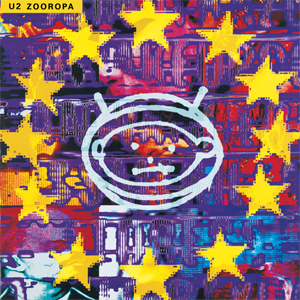
Zooropa is the eighth studio album by Irish rock band U2. Produced by Flood, Brian Eno, and the Edge, it was released on 5 July 1993 on Island Records. Inspired by the band's experiences on the Zoo TV Tour, Zooropa expanded on many of the tour's themes of technology and media oversaturation. The record was a continuation of the group's experimentation with alternative rock, electronic dance music, and electronic sound effects that began with their previous album, Achtung Baby, in 1991.
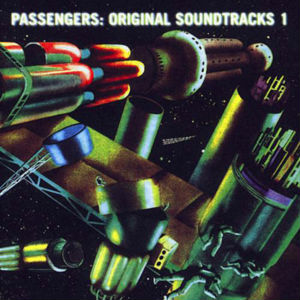
Original Soundtracks 1 is a studio album recorded by rock band U2 and Brian Eno under the pseudonym Passengers as a side project. Released on 6 November 1995, the album is a collection of songs written for mostly imaginary films. Owing to Eno's involvement as a full songwriting partner and the album's experimental nature, the moniker "Passengers" was chosen to distinguish it from U2's conventional albums. It was commercially unnoticed by the band's standards and received generally mixed reviews. Guest musicians on the record included Italian opera singer Luciano Pavarotti and producer Howie B, who would co-produce U2's following album, Pop (1997).

"Where the Streets Have No Name" is a song by Irish rock band U2. It is the opening track from their 1987 album The Joshua Tree and was released as the album's third single in August 1987. The song's hook is a repeating guitar arpeggio using a delay effect, played during the song's introduction and again at the end. Lead vocalist Bono wrote the lyrics in response to the notion that it is possible to identify a person's religion and income based on the street on which they lived, particularly in Belfast. During the band's difficulties recording the song, producer Brian Eno considered erasing the song's tapes to have them start from scratch.
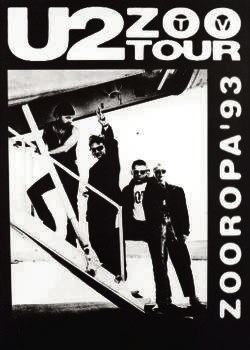
The Zoo TV Tour was a worldwide concert tour by rock band U2. Staged in support of their 1991 album Achtung Baby, the tour visited arenas and stadiums from 1992 to 1993. It was intended to mirror the group's new musical direction on Achtung Baby. In contrast to U2's austere stage setups from previous tours, the Zoo TV Tour was an elaborately staged multimedia spectacle, satirising television and media oversaturation by attempting to instill "sensory overload" in its audience. To escape their reputation for being earnest and over-serious, U2 embraced a more lighthearted and self-deprecating image on tour. Zoo TV and Achtung Baby were central to the group's 1990s reinvention.

"City of Blinding Lights" is a song by Irish rock band U2. It is the fifth track on their eleventh studio album, How to Dismantle an Atomic Bomb (2004), and was released as the album's fourth single on 6 June 2005. It was produced by Flood, with additional production by Chris Thomas and Jacknife Lee. The song reached number one in Spain, and peaked in the top ten in Canada, Ireland, the United Kingdom, and several other countries. The music video was shot at the General Motors Place in Vancouver, British Columbia, Canada.

"Lemon" is a song by Irish rock band U2. It is the fourth track on their eighth album, Zooropa (1993), and was released as its second single in September 1993 by Island Records. Inspired by old video footage of lead vocalist Bono's late mother, the lyrics describe an attempt to preserve memory through film. More than any previous U2 song, "Lemon" showcases Bono's falsetto vocal range, aided by atmospheric backing vocals from the Edge and Brian Eno. Mark Neale directed the accompanying music video. At almost seven minutes, it is among the band's longest songs.

"Numb" is a song by Irish rock band U2. It is the third track from their eight album, Zooropa (1993), and was released in June 1993 by Island Records and PolyGram as the album's first single. The song features a monotonous mantra of "don't" commands spoken by guitarist the Edge amidst a backdrop of various sound effects and samples. The noisy composition and lyrical concept for "Numb" were inspired by the theme of sensory overload, which had prominently been incorporated into the Zoo TV Tour. Lead singer Bono and drummer Larry Mullen Jr. provided backing vocals on the track.

"The Fly" is a song by Irish rock band U2. It is the seventh track from their 1991 album, Achtung Baby, and it was released as the album's first single on 21 October 1991 by Island Records. "The Fly" introduced a more abrasive-sounding U2, as the song featured danceable hip-hop beats, industrial textures, distorted vocals, and an elaborate guitar solo. Lead vocalist Bono described the song as "the sound of four men chopping down The Joshua Tree", due to its departure from the sound that had traditionally characterised the band in the 1980s.
"Zoo Station" is a song by Irish rock band U2. It is the opening track from their 1991 album Achtung Baby, a record on which the group reinvented themselves musically by incorporating influences from alternative rock, industrial, and electronic dance music. As the album's opening track, "Zoo Station" introduces the band's new sound, delivering industrial-influenced percussion and several layers of distorted guitars and vocals. Similarly, the lyrics suggest the group's new intents and anticipations. The introduction, featuring an "explosion" of percussion and a descending glissando for a guitar hook, was meant to make the listener think the album was mistakenly not U2's latest record or that their music player was broken.
"Bad" is a song by Irish rock band U2 and the seventh track on their 1984 album, The Unforgettable Fire. Thematically, the song is about heroin addiction, though lead vocalist Bono has given varying accounts of who was the inspiration behind his lyrics. "Bad" is considered a fan favourite and is one of U2's most frequently performed songs in concert. The band's 12-minute performance of the song at the Live Aid charity concert in 1985 was a breakthrough moment for them.
"The Wanderer" is a song by Irish rock band U2, and the tenth and final track from their 1993 studio album, Zooropa. It is one of the few U2 songs without Bono on lead vocals, instead featuring country singer Johnny Cash. Based on the Old Testament's Book of Ecclesiastes and its narrator "The Preacher", the song lyrically describes the narrator wandering through a post-apocalyptic world "in search of experience", sampling all facets of human culture and hoping to find meaning in life. Cash's haggard voice is juxtaposed against a synthesised bassline and mostly electronic instrumentation.
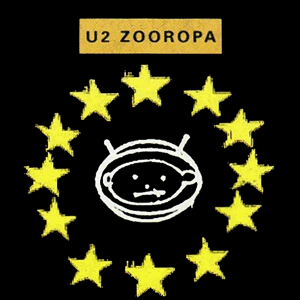
"Zooropa" is a song by Irish rock band U2, and is the opening track from their 1993 album of the same name. The song was the result of combining two pieces of music, the first of which was conceived in the studio, and the second of which was a soundcheck recording from one of the group's concert tours that was discovered by guitarist the Edge. The lyrics were written by lead vocalist Bono and describe two characters in a brightly lit city in a futuristic version of European society. Some lyrics in the song were taken directly from advertising slogans, and they also featured the phrase "dream out loud", which has appeared in other U2 media. The song touched on several themes, including moral confusion and the future of European society.
"The Hands That Built America" is a song by Irish rock band U2. It was released on the soundtrack to the film Gangs of New York, and was one of two new songs on the group's The Best of 1990–2000 compilation. It was nominated for Best Original Song at the 75th Academy Awards, but lost to Eminem's "Lose Yourself".
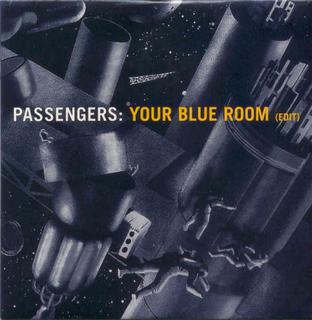
"Your Blue Room" is a song by Passengers, a group composed of rock band U2 and producer Brian Eno. It is the third track on the group's only release, the 1995 album Original Soundtracks 1. The track was written for the 1995 Michelangelo Antonioni–Wim Wenders film Beyond the Clouds. Though Eno made the majority of creative decisions during the recording sessions, "Your Blue Room" was one of the few tracks that the members from U2 tried to craft themselves.

The Million Dollar Hotel: Music from the Motion Picture is the soundtrack to the 2000 film The Million Dollar Hotel. The album was released alongside the film in March 2000, and featured Bono as its executive producer, with new music from U2 and other artists.
"Slug" is a song by Passengers, a side project of rock band U2 and musician Brian Eno. It is the second track on Passengers' only release, the 1995 album Original Soundtracks 1. The track was originally titled "Seibu" and was almost left off the album before it was rediscovered later during the recording sessions. Though Eno made most of the creative decisions during the recording sessions, "Slug" was one of the few tracks that the members from U2 tried to craft themselves.
"Acrobat" is a song by rock band U2, and is the eleventh track on their 1991 album Achtung Baby. The song developed from a riff created by guitarist the Edge, and is played in a 12
8 time signature. Lyrically, the song expresses themes of hypocrisy, alienation, and moral confusion. Although "Acrobat" was rehearsed prior to the third leg of the Zoo TV Tour, it had not been performed live until its debut on the Experience + Innocence Tour on 2 May 2018.

"Stay " is a song by Irish rock band U2. It is the fifth track on their eighth album, Zooropa (1993), and it was released as the album's third single on 22 November 1993 by Island Records. The song reached number one in Ireland and reached the top 10 in Australia, Iceland, the United Kingdom, and several other countries. The accompanying music video, directed by Wim Wenders, was shot in Berlin, Germany. The earliest incarnation of the song developed during sessions for the group's 1991 album Achtung Baby. It was written for and inspired by Frank Sinatra and bore his surname as the original working title. An alternative recording was used in the 1993 film Faraway, So Close!, also by Wim Wenders.
References
Footnotes
- 1 2 Zooropa (Media notes). U2. Island Records. 1993. 314-518 047-2.
{{cite AV media notes}}: CS1 maint: others in cite AV media (notes) (link) - ↑ Stokes (2005), p. 118
- 1 2 @U2/Calhoun (2013)
- ↑ "@U2".
- ↑ Fielder, Hugh (October 1993). "New 'Zooropa' Revue". Pulse! .
- ↑ Gettelman, Parry (23 July 1993). "U2: Zooropa". Orlando Sentinel . Retrieved 3 December 2012.
- ↑ Gill, Andy (1 July 1993). "Take the Cash and Run". The Independent . Retrieved 3 December 2012.
- ↑ Erlewine, Stephen Thomas (1993). "Zooropa – U2". AllMusic . Retrieved 3 December 2012.
- ↑ "In a decade where U2 got weird, Zooropa was the band's weirdest effort". The A.V. Club . 9 April 2013.
- ↑ Fricke, David (12 July 1993). "Tour Energy Spills Over into New U2 Album". Daily Herald .
- ↑ u2gigs.com
- ↑ "Pillow Book - Original Soundtrack | Songs, Reviews, Credits". AllMusic. Retrieved 19 September 2014.
Bibliography
- Stokes, Niall. Into the Heart: The Stories Behind Every U2 Song.
- Jackson, Joe (19 May 1993). "The Magical Mystery Tour". Hot Press . Retrieved 6 May 2011.